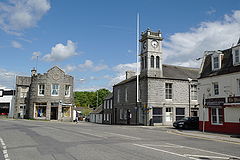Dalbeattie
Dalbeattie
|
|
|---|---|
 Dalbeattie Town Hall |
|
| Dalbeattie shown within Dumfries and Galloway | |
| Population | 4,227 (2011 Census) |
| OS grid reference | NX832613 |
| Council area | |
| Lieutenancy area | |
| Country | Scotland |
| Sovereign state | United Kingdom |
| Post town | DALBEATTIE |
| Postcode district | DG5 |
| Dialling code | 01556 |
| Police | Scottish |
| Fire | Scottish |
| Ambulance | Scottish |
| EU Parliament | Scotland |
| UK Parliament | |
| Scottish Parliament | |
Dalbeattie (Scots: Dawbeattie, from Gaelic Dail Bheithe meaning "valley of birch") is a town in Dumfries and Galloway, Scotland. Dalbeattie is in a wooded valley on the Urr Water 6 km (4 mi) east of Castle Douglas and 19 km (12 mi) south west of Dumfries. The town is famed for its granite industry and for being the home town of William McMaster Murdoch, the First Officer of the RMS Titanic.
There are indications from Court Records that a settlement existed on the site as early as 1658 and it is further mentioned in 1747. There is also evidence from Presbytery Records which indicate there was a School Master in Dalbeattie in 1751.
The formal beginnings of Dalbeattie originate in 1781 when George Maxwell of Munches and Alexander Copeland of Kingsgrange (or Colliston) decided to encourage the development of the town by feuing their property. The Maxwells owned the land on the north side of the burn and the Copelands owned the land on the south side. Every feu consisted of a piece of land, fronting a street, large enough to build a house and grow vegetables and keep chickens and pigs. Each feu also had the right to cut turves (peat) from Aucheninnes Moss. This was important as fuel was scarce in Galloway, coal was expensive and there were very few trees. The feu duties brought in an income for the landowners and gave security for the tenants.
The building of the bridge over the River Urr at Craignair in 1797 and the rapid expansion of the granite industry in Dalbeattie attracted more people to settle in the town. By 1810 work in the quarries was plentiful, and over the next 30 years a lot of tradespeople settled and founded businesses in Dalbeattie. However, the expanded population brought other problems, high incidents of sickness, including cholera and typhoid, and law-and-order issues.
The town today has a greatly reduced industry, and most residents commute to the nearby town of Dumfries for employment. The town is frequented by tourists as its position is well situated for access to the Solway coast.
...
Wikipedia

